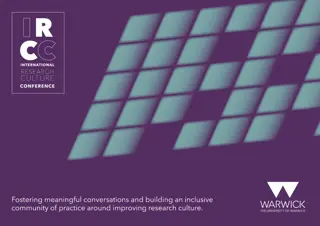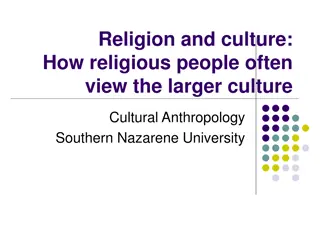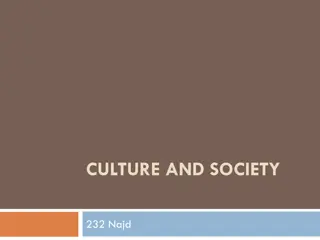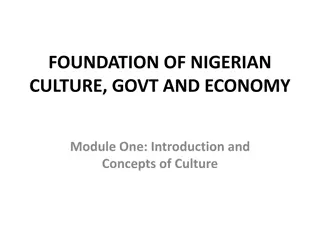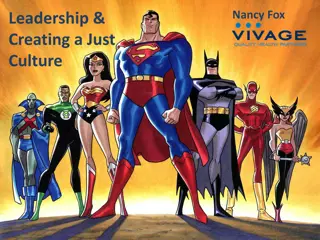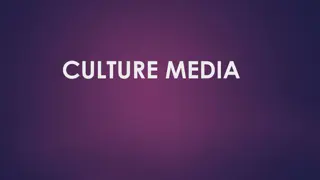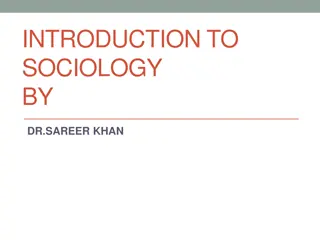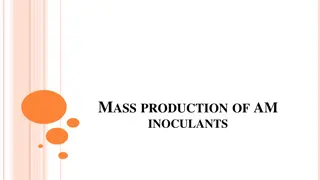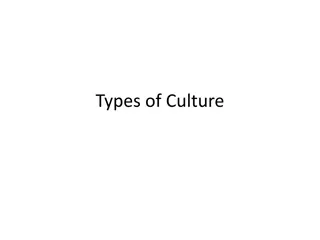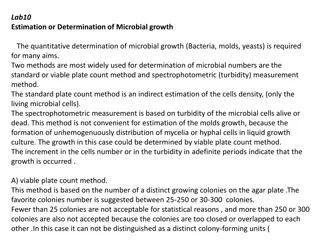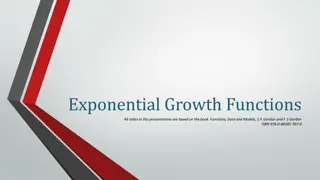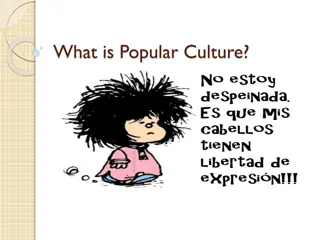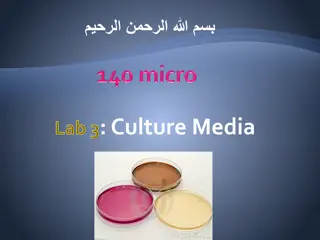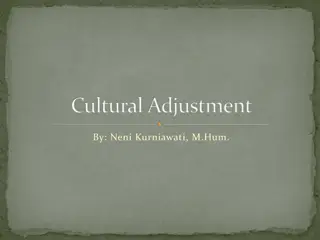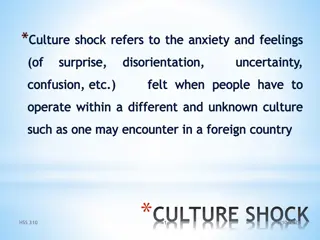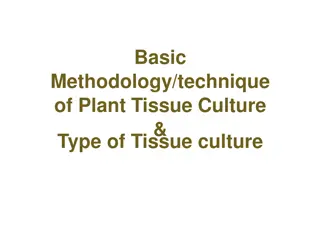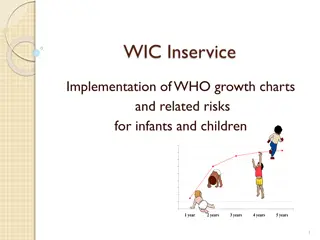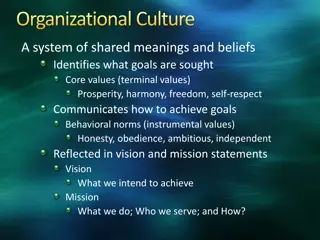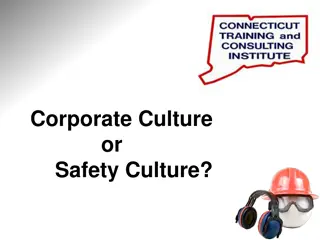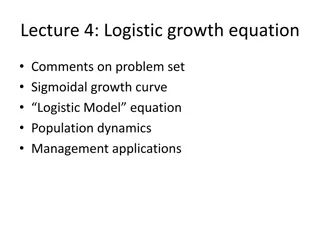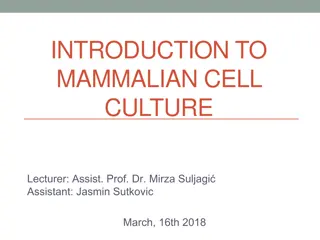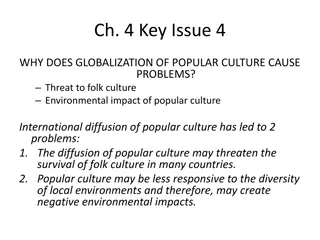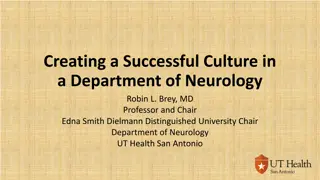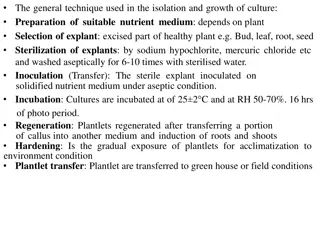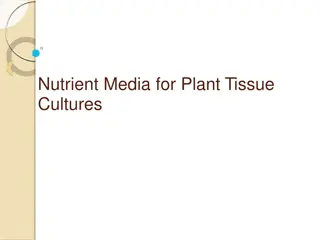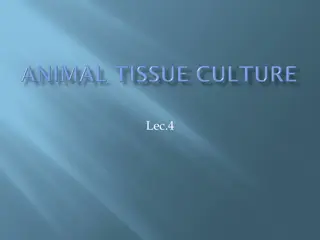IRCC International Research Culture Conference 2023: Empowering Global Communities
Explore the transformative potential of co-production in research and enterprise culture at the IRCC International Research Culture Conference 2023 hosted by Heriot-Watt University. Join Professor Jemina Napier, Dr. Fiona Armstrong, and Catalina Bastidas to delve into developing a purposeful global
10 views • 10 slides
Cell Culture Reagents Market Application, Size, Demand and Growth
The growth of this market is driven by factors such as the rising demand for monoclonal bodies, the increasing prevalence of chronic diseases, funding for cell-based research, and an increase in R&D spending in the life science sector. Furthermore, the growing adoption of 3D cell culture, the growth
0 views • 3 slides
Understanding Organizational Culture and Generational Myths in the Workplace
Explore the impact of organizational culture on employee engagement, the aspects shaping workplace culture, and the debunking of generational myths in the modern workforce. Discover how leadership can create a cohesive culture that benefits employees of all generations.
1 views • 39 slides
Enhancing University of Warwick's Research Culture through Work Experience Programs and Staff Development
This project aims to address social mobility issues in STEM by developing a research culture at the University of Warwick. Through internal funding sources, the project focuses on enhancing work experience programs and enabling staff development to support the wider university community. Key activit
3 views • 12 slides
Perspectives on the Relationship Between Religion and Culture
Religious people often perceive the larger culture in different ways, as illustrated by Richard Niebuhr's classic positions in "Christ and Culture" and Charles Kraft's later perspectives on God's role in culture. These viewpoints range from rejecting cultural influence to integrating Christianity an
1 views • 14 slides
Understanding Culture and Society
Culture and society are interconnected concepts, where culture encompasses beliefs, behaviors, and objects shared within a community, shaping their identity and values. Society, on the other hand, comprises individuals interacting based on common cultural bonds, whether ethnic, gender-based, or thro
0 views • 12 slides
Understanding Nigerian Culture, Government, and Economy: Module One
Delve into Module One of the course on Nigerian culture, government, and economy with a focus on the Introduction and Concepts of Culture. Explore definitions of culture, various types of culture, characteristics, importance, related concepts, levels, and differences between culture and ethnic group
1 views • 31 slides
Understanding Just Culture in Leadership: Creating a Fair and Error-Preventive Environment
Punitive culture in institutions can lead to mistakes being hidden, affecting error prevention. Dr. Lucian Leape highlights the importance of avoiding punishment for errors, advocating for a Just Culture model. This model, coined by David Marx, recognizes human error and helps differentiate between
0 views • 24 slides
Culture Media
Culture media play a crucial role in isolating bacteria from clinical specimens. Water, electrolytes, peptone, agar, meat extract, yeast extract, and blood/serum are essential constituents used in culture media. These components provide nutrients, solidifying agents, and growth factors necessary for
1 views • 26 slides
Understanding Plant Tissue Culture: Methods and Requirements
Plant tissue culture involves the in-vitro culture of plant explants under aseptic conditions, covering cell, organ, and suspension cultures. This process, pioneered by German botanist Gottlieb Haberlandt, relies on the totipotency of plant cells. Key requirements include laboratory organization, su
0 views • 18 slides
Leading to Safety
Examining the crucial link between organizational culture and safety programs, this content emphasizes the importance of fostering a culture of safety within organizations to ensure the success of safety initiatives. It explores the process of changing organizational culture, starting from defining
0 views • 20 slides
Understanding Culture in Sociology: Key Concepts and Definitions
Culture is the cornerstone of society, distinguishing humans from animals and shaping our social lives. Sociologists define culture as the shared values, practices, norms, and beliefs that govern our interactions and behaviors. This comprehensive guide explores the non-material aspects of culture, i
1 views • 30 slides
Understanding Plant Tissue Culture Media and Their Importance in In Vitro Growth
Plant tissue culture media play a crucial role in the in vitro growth and morphogenesis of plant tissues. The composition of culture media depends on the specific plant species and the type of material used for culture. Various types of media, such as White's medium, MS medium, B5 medium, N6 medium,
0 views • 6 slides
Overview of Cell Culture Methods and Importance in Research
Introduction to the principles of cell culture, including tissue culture, organ culture, and cell culture methods. Discusses the advantages and disadvantages of each technique and highlights the need for cell culture in research for studying cellular behavior and large-scale production of cell mater
3 views • 45 slides
Methods for Mass Production of AM Inoculants
Techniques for mass production of arbuscular mycorrhizal (AM) inoculants involve in vivo culture on green house plants, spore production with antibiotic treatment, field growth monitoring, and in vitro/axenic culture techniques. Solutions include using living roots, inert substances like vermiculite
1 views • 12 slides
Understanding Popular Culture: Classification and Impact
General classification of culture includes Popular, High/Elite, Low/Subculture, Primary & Secondary, Folk, and Co-Culture. Popular culture, shaped by mass media, encompasses ideas, attitudes, and phenomena favored by society. It influences daily life, with examples like styles of dress, slang, and s
0 views • 16 slides
Understanding Media Ecology: Impact of Communication Technology
Media ecology is a theoretical concept analyzing the influence of media and communication technology on human culture. Neil Postman, a prominent figure in the field, delves into how communication media affect human perception, understanding, and values. This study views media as environments shaping
4 views • 23 slides
Methods for Determination of Microbial Growth
Quantitative determination of microbial growth is crucial for various purposes, with two commonly used methods being the standard plate count and spectrophotometric measurement. The standard plate count method estimates living microbial cell density, while spectrophotometric measurement relies on tu
2 views • 6 slides
Perspectives on Youth Culture Through Functionalist and Neo-Marxist Views
Functionalist and Neo-Marxist perspectives on youth culture offer contrasting views on its purpose in society. Functionalist theorists emphasize the role of youth culture in providing a transitional phase for young people, aiding in their social integration and development of independence. On the ot
0 views • 11 slides
Understanding Exponential Growth Functions Based on Gordon's Book
This presentation delves into exponential growth functions using real-world examples such as the population growth of Niger. It covers topics such as algebra with exponents, finding formulas for growth models, terminology, and graphing population growth over time. The content explores how exponentia
1 views • 21 slides
Understanding Popular Culture and Ideology
Popular culture encompasses the lived practices and artistic products of society, contrasting with high culture. Various definitions highlight its appeal to a wide audience and its distinction from high culture. The relationship between popular culture and ideology is explored through practices that
0 views • 15 slides
Understanding Culture Media for Microorganisms
Culture media play a vital role in the growth and study of microorganisms. This content covers the primary ingredients required by all living organisms, types of culture media based on physical state, and specific media for bacteria and fungi. It explains the components and purposes of different typ
0 views • 24 slides
Understanding Cultural Adjustment: Navigating Different Ways of Life
Cultural adjustment involves experiencing culture shock when encountering a new way of life due to immigration, travel, or a shift in social environments. This process includes symptoms like excessive concern, fear of physical contact, and refusal to learn the host country's language. Overcoming cul
0 views • 12 slides
Understanding Culture Shock: Phases, Symptoms, and Coping Strategies
Culture shock is the anxiety and disorientation experienced when adapting to a new and unfamiliar culture. This phenomenon involves various stages, from the honeymoon phase to readjustment and reverse culture shock. Symptoms of culture shock can be physiologically, psychologically, and socially base
1 views • 11 slides
Proposed NRC Safety Culture Policy Statement Overview
This document provides an overview of the proposed Nuclear Regulatory Commission (NRC) Safety Culture Policy Statement presented by Eric Fries, the Safety Culture Program Manager. It covers topics such as NRC's mission, responsibility, safety culture background, draft policy statement, current statu
0 views • 24 slides
Plant Tissue Culture Methods for Growth and Reproduction Study
Plant tissue culture methods such as root tip culture, shoot-tip culture, leaf culture, flower culture, and anther and pollen culture allow for the study of growth, reproduction, and genetic variations in plants. These techniques involve culturing various plant parts under sterile conditions to inve
1 views • 20 slides
Understanding Organogenesis in Plant Tissue Culture Techniques
Plant regeneration through tissue culture techniques such as organogenesis plays a vital role in micropropagation and organ production. Factors affecting organogenesis include donor plant growth, culture medium, growth regulators, and environmental conditions. Chemical regulation and the use of epid
0 views • 10 slides
Plant Tissue Culture Techniques and Types Explained
Plant tissue culture involves the isolation and growth of plant cells in a controlled environment. The process includes preparation of nutrient medium, selection and sterilization of explants, inoculation on a solid medium, incubation, regeneration of plantlets, and transfer for hardening and growth
0 views • 38 slides
Understanding Oregon's Growth Model for Education Accountability
Oregon's Growth Model for education accountability uses a system that compares student growth to academic peers in the state. School growth ratings are determined based on levels of growth in reading and math, with a focus on tracking student progress over time. By comparing growth percentiles and s
0 views • 25 slides
Implementation of WHO Growth Charts for Infants and Children
Growth charts are essential for assessing children's growth, with WHO setting international standards since 2006. The discussion includes interpreting growth charts, the history of growth references, and the difference between reference and standard growth. It compares CDC's U.S. growth reference to
0 views • 30 slides
Understanding Organizational Culture and Its Impact on Business Success
Organizational culture encompasses shared beliefs, values, and behaviors within a company. It influences goal-setting, strategies, and employee actions. The transmission of culture is vital for aligning values with business practices. Culture matters for client relations, differentiation, and managi
0 views • 17 slides
Understanding Corporate Culture vs. Safety Culture in Organizations
Explore the dynamics of corporate culture and safety culture within organizations through a series of images and quotes. Learn about aligning goals, promoting a culture of safety, and the crucial factors that contribute to a safe workplace environment. Delve into the responsibilities of management,
0 views • 38 slides
Understanding Logistic Growth in Population Dynamics
Explore the logistic growth equation and its applications in modeling population dynamics. Dive into the concept of sigmoidal growth curves and the logistic model, which reflects population growth with limits. Learn how to calculate population change using the logistic growth equation and understand
0 views • 26 slides
Certificate Courses in Indian Cultural Studies by Department of Vedic Sciences & Indian Culture
Explore month-long certificate courses in Indian Cultural Studies offered by the Department of Vedic Sciences & Indian Culture in collaboration with Sri Aurobindo Foundation for Indian Culture. Delve into India's rich cultural heritage to gain insights into ancient wisdom traditions, prepare for con
0 views • 8 slides
Basics of Mammalian Cell Culture
Mammalian cell culture involves the removal of cells from an organism for growth in a controlled environment. Primary cell cultures can be sub-cultured, leading to the generation of cell lines. Sub-culturing involves transferring cells to fresh growth media for further growth. Different methods and
0 views • 29 slides
Challenges of Globalization in Popular Culture
Globalization of popular culture presents challenges such as the threat to folk culture and negative environmental impacts. Rising incomes lead to a shift from folk to popular culture, affecting traditional values and clothing symbolism. The adoption of Western clothing in Middle Eastern countries f
0 views • 12 slides
Cultivating a Successful Culture in Neurology Department
Importance of culture in a neurology department highlighted by Dr. Robin L. Brey. Emphasis on how culture trumps strategy and the role of leaders in maintaining a positive culture. Examples and insights on how culture influences decision-making and behavior. Attributes of a successful culture and ho
0 views • 21 slides
Plant Tissue Culture Techniques: Isolation and Growth
Plant tissue culture involves preparing a suitable nutrient medium, selecting healthy plant explants, sterilizing them, inoculating on solid medium, incubating under controlled conditions, inducing regeneration, and hardening before transferring to greenhouse or field. Various types of cultures can
0 views • 20 slides
Essential Nutrients for Plant Tissue Cultures: A Comprehensive Guide
The composition of culture media for plant tissue cultures includes inorganic and organic nutrients, sources of energy like sucrose and amino acids, and essential macro and micronutrients. Providing gas exchange, waste removal, and growth regulators, the medium supports plant growth by offering acce
0 views • 22 slides
Understanding Animal Tissue Culture and Cell Line Production
Animal tissue culture involves growing tissues separate from the animal in a laboratory setting. To achieve exponential cell growth, cells are converted into immortal cell lines. The production of a cell line involves steps like breaking cell adhesion, incubation, and transferring cells to fresh med
0 views • 22 slides



